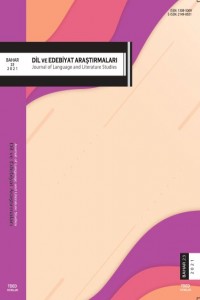Abstract
Türk tasavvuf edebiyatının kurucusu olan Ahmet Yesevî’nin Türkler arasında İslamiyet’in ve tasavvufun yayılmasında büyük rolü olmuştur. O, yetiştirdiği müritler vasıtası ile Türklerin yaşadığı coğrafyalarda derin izler bırakmıştır. Tasavvufun Anadolu’da yerleşmesi de onun tesiri ve düşünceleri ekseninde olmuş ve günümüze değin silsile halinde güçlü mutasavvıflar yetişmiştir. 17. yüzyılın tanınmış mutasavvıflarından biri olan Sun’ullah-ı Gaybî, icâzetini alarak Kütahya’ya yerleşmiş ve burada tasavvufî fikirleri ekseninde irşat vazifesini yerine getirmiştir. Gaybî’nin tasavvufî konuları işlediği birçok manzum ve mensur eseri vardır. Bunlardan biri de aruz ve hece vezni ile yazdığı şiirlerin toplandığı Dîvân’ıdır. Eserde ekseriyetle aruz vezni ile yazdığı şiirleri bulunur, bununla birlikte az da olsa hece vezni ile yazdığı şiirlere de rastlanır.
Çalışmada Sun’ullah-ı Gaybî’nin şiirleri tasavvufî yolculuk bağlamında incelenmiştir. Aşk yolculuğu olarak tanımlanan ve Allah’a ulaşmayı amaçlayan bu seyrin temel dinamikleri üzerinde durulmuştur. Dolayısıyla aşkı veren mürşit, aşkın muhatabı mürit, yolcunun en büyük yardımcısı aşk ve yolculuğun kendisi tasavvufî düşünce bağlamında Gaybî’nin şiirlerinden hareketle ortaya konulmuştur. Böylelikle hece ile yazdığı şiirlerde tasavvufî yolculuğu ve temel unsurları sıklıkla dile getirdiği, nutuk türüne uygun didaktik bir üslûp tercih ettiği; bu bağlamda Ahmet Yesevî ve Yunus Emre gibi büyük mutasavvıflardan etkilendiği ve onların düşüncelerini geleceğe taşıdığı sonucuna varılmıştır.
References
- Aydın, İbrahim Hakkı (2002). “Kenz-i Mahfî”, TDV İslâm Ansiklopedisi, C.25, s. 258-259.
- Bice, Hayati (2010). Divan-ı Hikmet, Ankara: Türkiye Diyanet Vakfı Yayınları.
- Bolat, Ali; Uyar, Mehmet; Cengiz, Muammer, (2019). Tasavvuf-Tarih, Doktrin,Tenkit-, Samsun: E Yazı Yayınları.
- Çatak, Adem (2012). Şihâbeddin Sühreverdî-Hayatı, Eserleri ve Tasavvuf Anlayışı-, Ankara: Afşar Matbaası.
- Fahruddîn-i Irâkî (2016). Uşşâknâme, Çev. Gökhan Çetinkaya, İstanbul: Büyüyenay Yayınları.
- Filiz, Lütfi (2010). Noktanın Sonsuzluğu, C. II-IV, İstanbul: Pan Yayıncılık.
- Gölpınarlı, Abdülbaki (1985). 100 Soruda Tasavvuf, İstanbul: Gerçek Yayınevi.
- Hâce Yûsuf-i Hemedânî (2002). Rutbetü’l-Hayât, Çev. Necdet Tosun, İstanbul: İnsan Yayınları.
- İbn Arabî (2011), Nefsin Terbiyesi, Çev. Selahaddin Alpay, İstanbul: Kırkambar Kitaplığı.
- İbn-i Haldun (tarihsiz). Mukaddime, Çev. Halil Kendir, C. 2, İstanbul: Marmara Belediyeler Birliği Kültür Yayınları.
- Kemikli, Bilâl (2000). Sun’ullâh-ı Gaybî Dîvânı, İstanbul: MEB Yayınları.
- Köprülü, M. Fuad (2003). Türk Edebiyatında İlk Mutsavvıflar, Ankara: Akçağ Yayınları.
- Schimmel, Annemarie (2012). İslamın Mistik Boyutları, İstanbul: Kabalcı Yayınları.
- Tatcı, Mustafa (2008). Yunus Emre, Dîvân, Risâletü’n-Nushiyye, İstanbul: H Yayınları.
- Yılmaz, Abdullah (2007). Gaybî Sun’ullah Dîvânı’nın Tahlili, Kütahya: Dumlupınar Üniversitesi Sosyal Bilimler Enstitüsü (yayınlanmamış yüksek lisans tezi) https://kuran.diyanet.gov.tr/tefsir/Fetih-suresi/4591/8-10-ayet-tefsiri (erişim, 24.01.2021)
Abstract
Ahmet Yesevi, the founder of Turkish Sufism literature, played a major role in the spread of Islam and Sufism among Turks. He left deep traces in the geographies where Turks live through his disciples. His thoughts had also great effects on the settlement of Sufism in Anatolia and strong Sufis have grown in a series until today. Sun'ullah Gaybi, one of the well-known sufis of the 17th century, settled in Kütahya by getting his permission and fulfilled the duty of guidance around his Sufi ideas. Gaybî has many poetic and prose works on Sufism. One of them is Dîvân, where his poems written with prosody and syllable meter are collected. He usually has poems written with the prosody meter although there are also a few poems he wrote with the syllable meter.
In the study, the poems of Sun'ullah-ı Gaybî were examined in the context of sufistic journey. The basic dynamics of this journey, which is defined as the journey of love and aims at reaching God, have been emphasized. Therefore, the mentor who gives love, the disciple who is the respondent of love, love as the greatest helper of the traveler, and the journey itself have been revealed in the context of Sufi thought based on the poems of Gaybî. Thus, in his poems he wrote with syllables, he frequently expressed the sufistic journey and basic elements and preferred a didactic style suitable for the type of speech. In this context, it was concluded that he was influenced by great Sufis such as Ahmet Yesevî and Yunus Emre and transferred their thoughts to the future.
References
- Aydın, İbrahim Hakkı (2002). “Kenz-i Mahfî”, TDV İslâm Ansiklopedisi, C.25, s. 258-259.
- Bice, Hayati (2010). Divan-ı Hikmet, Ankara: Türkiye Diyanet Vakfı Yayınları.
- Bolat, Ali; Uyar, Mehmet; Cengiz, Muammer, (2019). Tasavvuf-Tarih, Doktrin,Tenkit-, Samsun: E Yazı Yayınları.
- Çatak, Adem (2012). Şihâbeddin Sühreverdî-Hayatı, Eserleri ve Tasavvuf Anlayışı-, Ankara: Afşar Matbaası.
- Fahruddîn-i Irâkî (2016). Uşşâknâme, Çev. Gökhan Çetinkaya, İstanbul: Büyüyenay Yayınları.
- Filiz, Lütfi (2010). Noktanın Sonsuzluğu, C. II-IV, İstanbul: Pan Yayıncılık.
- Gölpınarlı, Abdülbaki (1985). 100 Soruda Tasavvuf, İstanbul: Gerçek Yayınevi.
- Hâce Yûsuf-i Hemedânî (2002). Rutbetü’l-Hayât, Çev. Necdet Tosun, İstanbul: İnsan Yayınları.
- İbn Arabî (2011), Nefsin Terbiyesi, Çev. Selahaddin Alpay, İstanbul: Kırkambar Kitaplığı.
- İbn-i Haldun (tarihsiz). Mukaddime, Çev. Halil Kendir, C. 2, İstanbul: Marmara Belediyeler Birliği Kültür Yayınları.
- Kemikli, Bilâl (2000). Sun’ullâh-ı Gaybî Dîvânı, İstanbul: MEB Yayınları.
- Köprülü, M. Fuad (2003). Türk Edebiyatında İlk Mutsavvıflar, Ankara: Akçağ Yayınları.
- Schimmel, Annemarie (2012). İslamın Mistik Boyutları, İstanbul: Kabalcı Yayınları.
- Tatcı, Mustafa (2008). Yunus Emre, Dîvân, Risâletü’n-Nushiyye, İstanbul: H Yayınları.
- Yılmaz, Abdullah (2007). Gaybî Sun’ullah Dîvânı’nın Tahlili, Kütahya: Dumlupınar Üniversitesi Sosyal Bilimler Enstitüsü (yayınlanmamış yüksek lisans tezi) https://kuran.diyanet.gov.tr/tefsir/Fetih-suresi/4591/8-10-ayet-tefsiri (erişim, 24.01.2021)
Details
| Primary Language | Turkish |
|---|---|
| Journal Section | ARTİCLES |
| Authors | |
| Publication Date | March 20, 2021 |
| Acceptance Date | March 11, 2021 |
| Published in Issue | Year 2021 Issue: 23 |
Journal of Language and Literature Studies is licensed under the Creative Commons Attribution-Non-Commercial-NoDerivatives 4.0 International Licence (CC BY-NC-ND 4.0).

